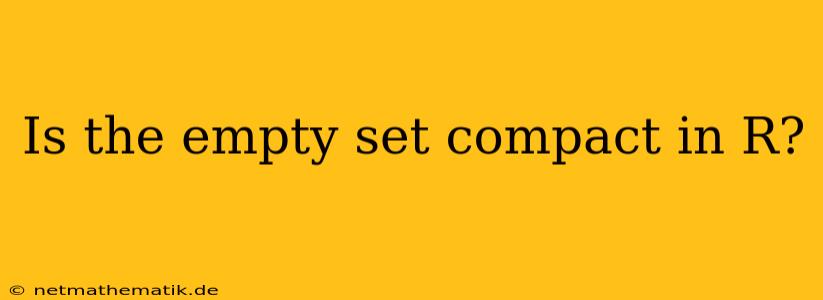The question of whether the empty set is compact in the set of real numbers, denoted by R, might seem trivial at first glance. However, understanding the concept of compactness and its application to the empty set requires a deeper dive into the definition and properties of topological spaces.
Compactness in Topology
In topology, a compact set is a set where every open cover has a finite subcover. This means that for any collection of open sets whose union contains the entire set, we can always find a finite number of those open sets whose union still covers the set.
To understand this definition in the context of R, let's consider an open cover. An open cover of a set in R is a collection of open intervals whose union contains the entire set.
For example, the set of all open intervals of the form (n, n+1), where n is an integer, forms an open cover for R. Each real number belongs to one of these intervals. However, this open cover has no finite subcover. This is because any finite collection of these intervals would leave out an infinite number of real numbers.
The Empty Set and Compactness
Now, let's focus on the empty set, denoted by ∅. The empty set is a subset of every set, including R. To determine whether it's compact, we need to see if every open cover of ∅ has a finite subcover.
A crucial point to note is that ∅ has no elements. This means that any collection of open sets, no matter how many or how large they are, will always cover ∅. This is because the union of any collection of sets will always contain ∅.
Since any open cover of ∅ automatically has a finite subcover (in fact, it has an empty subcover), ∅ satisfies the definition of compactness.
Why is this relevant?
While the result that ∅ is compact may seem trivial, it's important to understand its implications:
- Universality: The empty set is compact in any topological space. This is because the argument we used for R applies to any topological space. The empty set is always a subset, and any collection of open sets will cover it.
- Completeness of the Definition: The definition of compactness works consistently even when considering "empty" sets. This is a crucial aspect of mathematics, ensuring that concepts and definitions are general and robust.
Conclusion
In summary, the empty set ∅ is compact in R (and in fact, in any topological space). This result arises from the definition of compactness and the fact that ∅ is a subset of every set, including R. Understanding this seemingly simple result helps us grasp the universality and completeness of the concept of compactness in topology.
